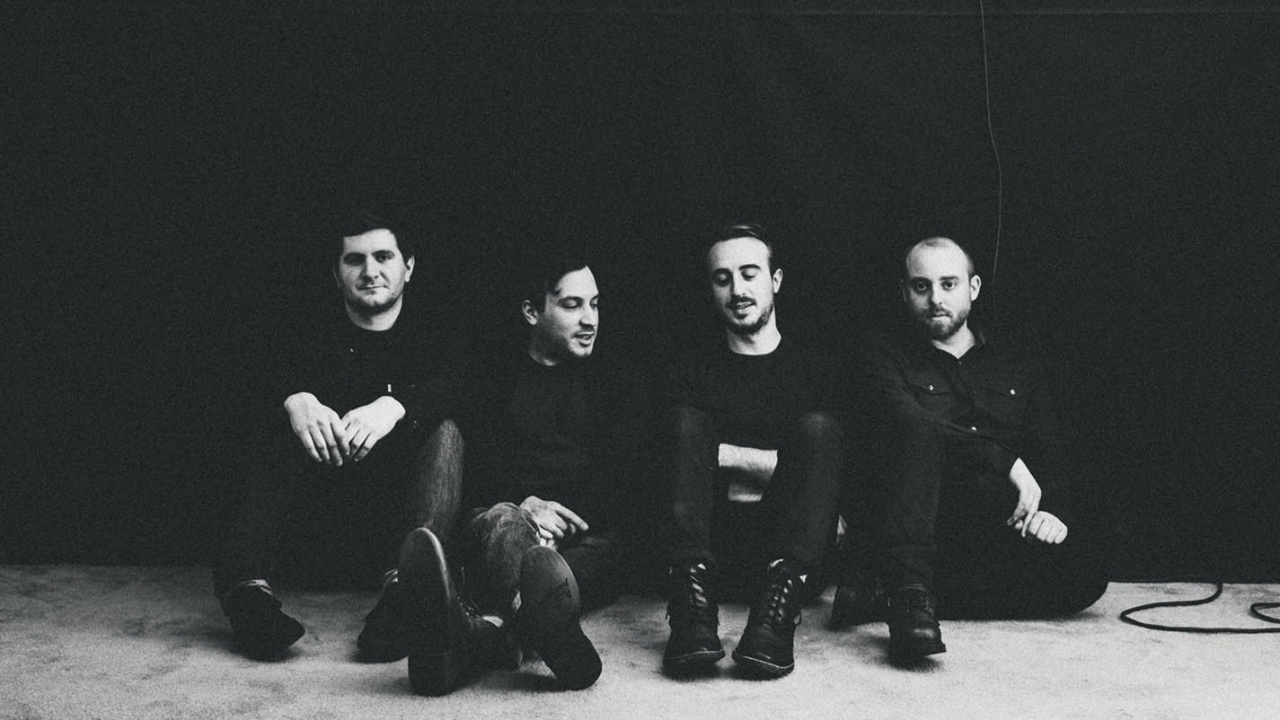Scranton, PA four-piece The Menzingers came together in 2006, but they’ve evolved a lot since then.
They’ve always been good – co-frontmen Greg Barnett and Tom May each writing raw, rough punk rock bursting with heart and soul – but with 2012’s On The Impossible Past they transcended their genre. Much like The Gaslight Anthem’s The ’59 Sound, that album encapsulated the promise – and, more importantly, the reality – of the American dream through a compelling series of narratives, juxtaposing those hopes against a sad setting of lost love and drink driving, soul searching and existential crisis in a broken America. Its widespread critical acclaim certainly raised expectations for the follow-up, but with Rented World, the band’s fourth full-length, The Menzingers proved their worth once again. An album that flits between the elegiac and the acerbic, it’s another incisive vision of the world that transforms personal tales from their hometown into universal truths about the human condition. Greg Barnett took some time out to talk about the rented world of theirs that we all live in.
Rented World has just been released. How do you feel now that it’s out there in the world?
“I feel great. It’s what we’ve been working towards for the last two years and people seem to really love it. Our friends and family love it, which is kind of the most important thing. We played a secret record release show at a house in Philly and the new songs went over extremely well. So that’s a good sign! It’s just fun to be at the part where you’re ready to start a whole year of touring and play new songs.”
It seems, like the last one, that this is an album you’re stepping outside of your genre with - it’s not just punk rock anymore.
“Absolutely. And that’s always the idea – we don’t go in saying we want to write a record that sounds like this, but we want to write a record that doesn’t necessarily sound like something. We try as many different ideas as possible, throw them together and see what sticks. To write the same album over and over again would be boring.”
Were you worried about pressure? On The Impossible Past was so well-received – did that play an important part in how you approached this one?
“Honestly, not that much. We were just so confident when we were writing – and we still are – but once you believe in yourself and you believe in what you’re doing the pressure kind of goes away. It wasn’t until recently that everyone was like, ‘Oh man – that last record was a big deal. I forgot about that!’ but we never really let that stuff get to us. We do it because it’s fun, really. We just like writing songs and playing live!”
It’s funny that you mention fun – and you sound buoyant right now, too – because some of these songs are really, really sad. Is that all stuff you’re going through?
“Yeah. It’s what I’m going through and what Tom’s going through, too. I think that writing sad songs essentially brings closure to difficult parts in your life. That’s how it’s always been for me. Sometimes it’s like ‘You’re bumming everybody out – write a happier song!’ But it doesn’t really work that way. It is just a big sense of closure with heavy parts of my life, where I can write them, be done and share them people, and then people can share their stories back.”
So who are you writing these songs for – the people they’re about, or yourself?
“Well, first, I’m writing them for myself. When I sit down on a couch with an acoustic guitar, it’s like, ‘This is mine.’ I’m not thinking of anyone hearing them. But as it grows and we form the song, it becomes something bigger than that and you hope people can take things away from it.”
It begs the question, though: what would you prefer – the relationship or the song?
“I think a lot of times when you try to write a song, especially about a relationship or something, the relationship is always a lot more idealised. You pick parts out of it that were the best parts or the worst parts, and that’s what it comes down to. It’s a funny concept to base parts of your life around songs, because it’s like ‘That sounded pretty damn bad.’ In theory, it might not have been that, but you have to put yourself in that place – when you dive into it you find those emotions that stick with you.”
It does seem that both you and Tom have trouble letting go of the past – your songs have one foot in the present but always one foot in the past, too.
“I think that’s trying to find some clarity in all of it, trying to make sense of things that, at the time, never made any sense. I think it’s kind of cool to put your current life, your past life, what you assume will be the future, under a microscope and pick it apart and put it on paper.”
Does that increase the chance of regret, though?
“Absolutely! You can make situations so much worse than they ever were. You can look at things that were so minute and blow them up out of proportion, and now you’re stuck singing this song two hundred days a year and it’s always in your head.”
